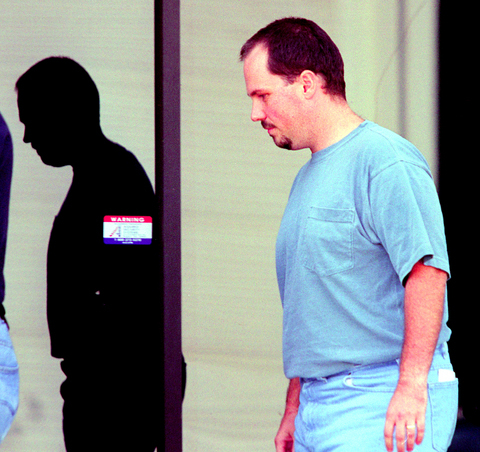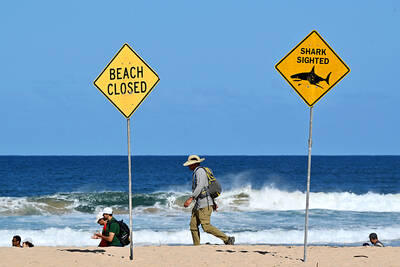It could have ended three years ago, when a leaky FedEx box containing an arm and legs turned up in Missouri. Or years before that, when a judge convicted him of embezzling money from the sale of a corpse that belonged to a medical school in California.
But nothing stopped Philip Joe Guyett Jr. from moving steadily eastward, mining gold from the lucrative body parts trade. US federal officials shut down this flesh-and-bone prospector in Raleigh, North Carolina, earlier this month, saying his products posed a danger to public health.
By then, Guyett had supplied hundreds of tissues for knee repairs, spine surgeries and other medical procedures around the US, many of them allegedly procured in a non-sterile funeral home embalming room.

PHOTO: AP/LOS ANGELES TIMES, GLENN KOENIG
Despite his criminal record, he twice was able to register companies with the US Food and Drug Administration (FDA) to provide tissue for transplants.
"Here's a convicted felon who could pretty much go anywhere in the country and open a tissue recovery agency," complained one tissue banker who refused to work with him, Ken Richardson of Nevada Donor Network. "That illustrates some of the problems with our existing regulatory structure."
Guyett, 38, denies any wrongdoing, and insists that he went out of business on his own accord some months back.
AT RISK
No one yet knows how many people received tissue he supplied or what risks they may face. Companies have been quietly recalling his products from doctors and hospitals since early last month.
Many who work in this field are outraged by the problem, the second big tissue scandal in a year, following one that led to criminal charges in New Jersey.
But a three-month investigation by the Associated Press, published in June, found that lax oversight of the billion-dollar industry allows such situations to occur and puts the public at risk.
Donated cadaver tissue is used in more than a million procedures each year, and most of these operations do a lot of good.
But poor testing or treatment can lead to infections like hepatitis -- and even death. Oversight is up to the FDA, but it relies on broad-brush rules. The American Association of Tissue Banks has strict standards, but the FDA does not require firms to abide by these rules.
"In this business what really rules is: Do you have the goods? Can you give the body parts that I need? If you have a sketchy background, that doesn't really make a difference. People just want to get the parts," said Annie Cheney, author of the book Body Brokers.
Time after time, the smooth-talking, affable Guyett found ways to get the goods.
"Our mission," he said when pitching tissue donation to residents of a suburban Raleigh retirement home last year, "is to give donors and their families an informed choice when considering making an anatomical gift."
MURKY RESUME
How and when Guyett got into the business isn't clear. Parts of the resume he gave the group sponsoring his talk do not match what others say. Like being an anatomy instructor at Mount San Antonio College in Walnut, California, from 1997 to 1999. The school has no record of an instructor by that name, a school official said.
The resume also lists Guyett as a "forensic specialist" from 1993 to 1997 in the Clark County, Nevada, coroner's office. But that title isn't used at the Las Vegas agency and Guyett only volunteered there some weekends between 1994 and 1996 and was not a paid employee, said Coroner Michael Murphy.
Undisputed, though, is that Guyett was an administrator at the willed body program at Western University in Pomona, California, in 1999 when police charged him with selling a cadaver to another school and keeping the US$1,100 payment.
He pleaded no contest to embezzlement; other charges, unlawful removal of human remains and grand theft, were dropped, said a spokeswoman for the Los Angeles County District Attorney's office. He was fined and sentenced in April 2000, performed six months of community service and was given three years' probation.
By the fall of 2003, he was in Las Vegas, registering Donor Referral Services with the FDA as a human tissue business. Soon afterward, Missouri police discovered human limbs in a leaky FedEx container Guyett's firm had shipped to a Missouri man who provides body parts for medical research and teaching.
"Boxes break," Guyett told the St. Louis Post-Dispatch. "If a box leaks and it's carrying a cornea, no one freaks."
At the time, Guyett and his second wife lived in a suburb of Las Vegas. But business apparently was slow. By the summer of 2004, Guyett was planning to relocate.
Larry Parker, president of Cremation Society of the Carolinas, a Raleigh funeral home, got a call from Guyett, whom he didn't know, saying he was thinking of moving to be closer to the East Coast tissue banks he worked with.
By November 2004, Guyett had moved to Raleigh, and was paying Parker US$1,000 for each successful donor family he referred and use of his embalming room. He also pursued a related business -- recycling titanium screws, implants and pins left over after cremation.
ALTERED PAPERWORK
The FDA closed Guyett's Raleigh operations down on Aug. 18.
According to the FDA's order, Guyett altered paperwork on the health history and age of at least five dead donors, eliminating mention of factors like cancer and drug use that might make them ineligible.
In a brief interview last week at his two-story brick home in north Raleigh, Guyett said the FDA did not force him out, and that he had done nothing wrong.
"I closed on my own free will to pursue other ventures," he said.
The Guyett case follows that of Biomedical Tissue Services, a now-defunct New Jersey firm accused of plundering corpses for tissue without families' permission. Four people face charges in that scandal.
There are more under-the-radar tissue brokers out there than the FDA would like to think, said Areta Kupchyk, a former FDA attorney who helped write tissue regulations and consults with tissue companies.
"He's probably an example of many small-timers around the country," Kupchyk said of Guyett. "They're the ones that are the most dangerous. They get a small niche and they can cause a lot of trouble."

With much pomp and circumstance, Cairo is today to inaugurate the long-awaited Grand Egyptian Museum (GEM), widely presented as the crowning jewel on authorities’ efforts to overhaul the country’s vital tourism industry. With a panoramic view of the Giza pyramids plateau, the museum houses thousands of artifacts spanning more than 5,000 years of Egyptian antiquity at a whopping cost of more than US$1 billion. More than two decades in the making, the ultra-modern museum anticipates 5 million visitors annually, with never-before-seen relics on display. In the run-up to the grand opening, Egyptian media and official statements have hailed the “historic moment,” describing the

SECRETIVE SECT: Tetsuya Yamagami was said to have held a grudge against the Unification Church for bankrupting his family after his mother donated about ¥100m The gunman accused of killing former Japanese prime minister Shinzo Abe yesterday pleaded guilty, three years after the assassination in broad daylight shocked the world. The slaying forced a reckoning in a nation with little experience of gun violence, and ignited scrutiny of alleged ties between prominent conservative lawmakers and a secretive sect, the Unification Church. “Everything is true,” Tetsuya Yamagami said at a court in the western city of Nara, admitting to murdering the nation’s longest-serving leader in July 2022. The 45-year-old was led into the room by four security officials. When the judge asked him to state his name, Yamagami, who

DEADLY PREDATORS: In New South Wales, smart drumlines — anchored buoys with baited hooks — send an alert when a shark bites, allowing the sharks to be tagged High above Sydney’s beaches, drones seek one of the world’s deadliest predators, scanning for the flick of a tail, the swish of a fin or a shadow slipping through the swell. Australia’s oceans are teeming with sharks, with great whites topping the list of species that might fatally chomp a human. Undeterred, Australians flock to the sea in huge numbers — with a survey last year showing that nearly two-thirds of the population made a total of 650 million coastal visits in a single year. Many beach lovers accept the risks. When a shark killed surfer Mercury Psillakis off a northern Sydney beach last

‘CHILD PORNOGRAPHY’: The doll on Shein’s Web site measure about 80cm in height, and it was holding a teddy bear in a photo published by a daily newspaper France’s anti-fraud unit on Saturday said it had reported Asian e-commerce giant Shein (希音) for selling what it described as “sex dolls with a childlike appearance.” The French Directorate General for Competition, Consumer Affairs and Fraud Control (DGCCRF) said in a statement that the “description and categorization” of the items on Shein’s Web site “make it difficult to doubt the child pornography nature of the content.” Shortly after the statement, Shein announced that the dolls in question had been withdrawn from its platform and that it had launched an internal inquiry. On its Web site, Le Parisien daily published a